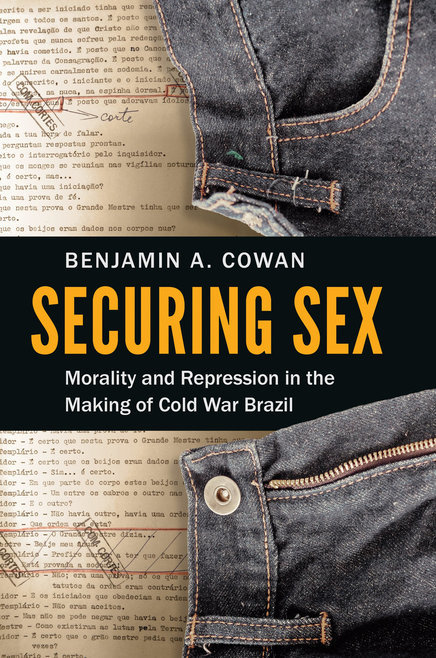Interview by Zeb Tortorici
Ben Cowan‘s book Securing Sex: Morality and Repression in the Making of Cold War Brazil (UNC Press, 2016) is unique in the sense that it engages and analyzes the discourse of the right in Brazil during the Cold War. Using a fascinating corpus of under-utilized archival documents—many of which come from the archives of Brazil’s Higher War College, the Escola Superior de Guerra—and oral histories that the author conducted with ex-military supporters and leaders, Cowan shows how everyday support for the Brazilian military dictatorship (1964-85) was forged in response to perceived threats against the institutions of family and religion, as well as to morality itself. In the cultural and political upheaval of the 1960s and 1970s, members of the right in Brazil increasingly conflated communist “subversives” and left-wing politics with topics like homosexuality, feminism, reproductive rights, and pornography. Securing Sex offers readers insight into the rhetoric, beliefs, and realities of Brazil’s repressive right, demonstrating that the harsh political realities of the dictatorship had as much to do with gender, sexuality, and morality as it did with counter-subversive tactics and transnational politics of anticommunism. Ultimately, Cowan shows us how the right constructed the very idea of the communist “subversive” through an association with sexual and moral deviance. Such insight has more relevance than ever given the current political climate in which we find ourselves.

Zeb Tortorici: First, I would like to say what an absolute pleasure it was to read your book, especially given that it is a project with which I have been familiar since we both started our doctoral studies in History at UCLA several years ago. Your book offers such a fascinating insight into the fantasies, realities, and rhetoric of the right in Brazil during (and prior to) the military dictatorship of 1964-85. So, I want to commend you on a fabulous and fascinating work!
To start, what led you to conduct the research that went into this book? Did the project shift significantly since the time you first conceptualized it, to the time you published Securing Sex?
Ben Cowan: I started off interested in several related paths of inquiry: I wanted to know about the roots of dictatorial violence in Cold War Latin America, about the relationship between that violence and anticommunism and imperialism in the North Atlantic (especially the US), and about how Cold War politics drew on and impacted people’s lives when it came to culture, gender, morality, and sexuality. I wanted to think about the big frameworks for how people construct difference, and apply those to Cold War Latin America, and especially to Brazil.
The project shifted quite a lot. I think most importantly, the story was much more complex than I could have anticipated, especially in terms of its contradictions. To cite one fairly succinct example, an authoritarian, censorial dictatorship, that in my view was driven in part by moralism, was also funding the production of pornographic movies made by filmmakers who were by no means friends of the regime. And that’s just one contradiction. But even when it came to the stories that were immediately apparent to me—those of moralism and sexual traditionalism linked with anticommunism—I was surprised at the breadth of activity on these fronts, from everyday policing to high-level ideological development to the elaboration of nation-wide educational programs.
ZT: Your project addresses a historiographical gap on the attitudes, beliefs, and practices of the right, and does so in a way that, in your own words, “recovers the lost stories of the repressive right.” Why have these stories of the right, especially in the context of twentieth-century Latin American military dictatorships, been so neglected by scholars? And, what do we stand to gain by offering a more complete picture of how the right—in both the past and the present—conceptualized the so-called moral dissolution of those whose acts were perceived to somehow challenge the institutions of the family, the state, traditional gender roles, and the like?
BC: The first question is in some ways an easy one to answer—and, then again, a hard one, a painful one, and a common one in the days of Trumpism. The short answer is that I think the historiographical narrative of repression and revolution was disposed to favor the latter half of that formula, and to minimize right-wing ideologies as something like bumps in the road to liberal consensus. That is, I think perhaps many historians, myself included, have tended to sympathize with and thus focus on progressive forces and to presume, consciously and/or subconsciously, and despite our better judgment vis-à-vis theories of progress, that twentieth-century histories generally moved across landscapes of modernization and secularization toward the further crystallization of pluralistic, liberal democracy. I myself am certainly guilty of that. But even if most professional historians are unsympathetic to right-wing viewpoints, or because a hegemonic vision of history marginalizes them as unimportant, they have indeed been ignored. From the perspective of Brazilian or US national politics that now seems like a mistake—but an understandable one, and one that I think we can begin to correct.
As for what we stand to gain, I think that remains the same for me as it was when I began this project. I think it is important to recognize the power bound up in cultural reactions and conservatisms, especially when they are deployed, time and time again, as the fodder for constructing difference and enacting various forms of violence. If nothing else, I hope that my book contributes to our understanding of the frameworks commonly used to construct difference and enact violence. And those frameworks definitely include gender, sexuality, and morality.
ZT: How do you see your own book resonate in the current political climate of the day, when national and local governments in Brazil, the United States, Argentina, France, England, and elsewhere are shifting to the right? Do you see similarities (or lessons) in how sex itself can challenge this rhetoric? Phrased another way: How can sex and gender be radical in political climates dominated by the right?
BC: Certainly I see the book resonating in the cultural politics of Brazil and the United States, where the moralisms of the Cold War have reappeared in the form of the New Right. That comparative history is really the heart of my next project. I think this first book helps situate the Cold War across the hemisphere as part of the origin story of what we have long called “the culture wars”—wars that we are still fighting, obviously. I don’t think sex can in and of itself challenge the language and tactics of cultural conservatism—after all, in some ways the “love is love” and “no H8” version of sex-positive and inclusive politics is in and of itself conservative and exclusive, given its focus on same-sex marriage. Still, I do think that by being aware of the ways that conservative anxieties about sexuality are not dismissible and are linked to other fears and resentments, we can use the complexity of sexuality to implicitly and rather organically challenge traditionalism. As the book shows, sex is ultimately impossible to “secure,” so to speak—even when powerful constituencies wish to do so. We do, then, have that in our favor when we think about creating more inclusive, sex-positive narratives: the fact that the complexities of sex and capitalism make it impossible to really repress the one while promoting the other.
ZT: There was absolutely so much that I found illuminating about your book, especially given my own current research on the history of pornography. Can you speak some to the ways (and reasons why) the repressive right connected its own perceptions of the “pornographic” to communism, abortion and birth control, and political activism on the part of the left? In other words, why was there, for many, little or no division between anti-communism and anti-obscenity under the dictatorship?
BC: I think there are many ways of answering this question. What I tried to put forth in the book is that anti-communists made anti-obscenity one of their rallying cries for several reasons: (1) their connection to a network of other anti-communists around the Atlantic who popularized this narrative, largely via a relatively myopic set of interlocutors; (2) the association of communists with an “animal” desire and a lack of spiritual/intellectual humanism made the connection between communism and sexual depravity seem obvious to some anti-communists; (3) anti-communist “experts” drew on histories that were by no means up-to-date, associating (for example) Soviet communism with free love long after Stalinism had put paid to that idea; (4) Brazil’s anti-communists and other conservatives were reacting to very real changes in the country’s and the world’s media landscape—especially the rise of glossy print media and of television and movies. In Brazil, there really was an “explosion” of pornography in the 1970s that played right into the hands of moralists who conflated their twin enemies: pornography and revolution.
ZT: I found it fascinating to see how essentialist ideas played themselves out in the specific historical contexts that your book traces, from the Vargas presidency (1930-37) and dictatorship (1937-45) well through what many experienced as the “turmoil in culture, politics, and morality” of the 1960s and 1970s. What I found equally fascinating—and not entirely unexpected—was how there was a vibrant strand of homophobia and gender conformity among the left. How did such homophobia play itself out, and what do you see as some of its effects on resistance to the military dictatorship?
BC: Well, I certainly can’t take credit for discovering left-wing homophobia and conventionality—I was wondering a lot about that myself, and was helped by several other excellent historians and by those who lived through those years. In a sense, none of this is surprising, given the general homophobia of left-wing activists and revolutionaries elsewhere. Certainly in the two supposed poles of the Cold War (the US and the USSR), the left, old as well as new, had a volatile relationship with homosexuality and with gender deviance. This, of course, is not to mention Cuba and any number of other loci for considering this relationship. But I think the way that homophobia played itself out in Brazil is fascinating because it is really the story of identity politics—censors were concerned with the visibility of effeminate men in popular culture, and it was not until an organized movement appeared that security forces began systematically writing about homosexuality as evidence of communist conspiracy. Certainly I think this led to some unnecessary rifts on the left—as in the case of Fernando Gabeira who returned from exile only to be shunned by his less sexual liberation-minded peers. It does make one wonder how intersectionality might really benefit today’s left, were progressives able to make that leap.
ZT: I was wondering if you might speak a bit to the question of historical practice, methodology, and archival access. In particular, your work sheds light on a largely neglected topic of research in historical scholarship, and I would love to hear more about how you arranged access to some of your sources in places like the military archives and the Escola Superior de Guerra (National War College). What were some of the greatest archival challenges that you faced?
BC: This is such a great question, because so many of the archives I visited were … unconventional. A few were entirely off the map, and I only found them by word of mouth or via other sources. The key ones—the ESG or Escola Superior de Guerra (National War College), the ADESG or Associação dos Diplomados da Escola Superior de Guerra (Alumni Association of the National War College), and the ECEME or Escola de Comando e Estado Maior do Exército (Command and General Staff College)—were not exactly hidden, just ill-used and perhaps not readily thought of. When I showed up in each of those places, the attendants—often military personnel themselves—graciously helped me, but seemed very surprised to see me, and more than a little bit curious about what I was doing and how I had found them. So, part of the challenge, I suppose, was ferreting these places out and then finding the confidence to just show up, and the stubbornness to just wait around until someone else showed up to grant me access. All of that, though, got easier and easier as time went on. And to be honest, I felt lucky—these were collections that were for the most part well organized, even if they had never been used before. So once I found what I was looking for, the work was relatively straightforward.
ZT: How was your own research perceived among Brazilian archivists, historians, and scholars with whom you worked over the course of your research? I am equally interested in hearing more about how the process of seeking out (and documenting) your oral histories with ex-participants and ex-supporters of the military dictatorship influenced the directions that your project took. How do you think that your own subjectivity potentially affected the ways that your informants narrated their stories of their perceptions of the left?
BC: I have encountered nothing but excitement and helpfulness—such a spirit of collaboration—from other Brazilian researchers and most certainly from archivists. The archivists especially at the branch of the National Archives in Brasília, familiarized themselves with my work and went above and beyond the call of duty to help me find what I needed and more. And I have so many Brazilian scholars to thank for cluing me in to sources and individuals I might want to research.
As for the oral histories, I was a bit surprised by how willing people were to talk to me and how little they cared to find out (1) who I was or (2) what my project was. As I learned early on in my oral history training, and then again “on the job,” people do want to tell their stories. My main job is to listen. That doesn’t mean, of course, that I’m not affecting the process and the narrative in all kinds of ways—but that problem was more minimal than I could have imagined, from my perspective. Most of my informants were eager not only to expound the positions they’d held during the dictatorship but to underscore the ways in which their ideologies had not changed since that time. This, it turned out, was not so much a defensiveness as a desire for justification, which worked to my advantage, historiographically speaking.
ZT: How has the writing of Securing Sex influenced the directions that your future research is currently taking?
BC: During the research, I began to notice the emergence of a different kind of conservatism toward the end of the dictatorship—one that resembled the New Right in the United States, that incorporated evangelicals as a powerful element, and that retained anticommunism even after the Cold War when most of us knew it was long over. So, I see my second project as an outgrowth of the first. Basically, studying the right in the more limited context of the first book has given me the tools I need when asking bigger questions in this second book, like: Where did the religious right come from? How do we make sense of neoconservatism as both capitalist and deeply spiritual, and as uniting so many seemingly unrelated priorities? And most importantly, how do these questions lend themselves to more comprehensive, convincing answers if we look at them with a transnational lens?
 Ben Cowan received his B.A. from Harvard University and his M.A. and Ph.D. from UCLA. His interest in right-wing radicalism, morality, sexuality, and 20th-century imperialism has led him to research focused on Cold War Brazil, with a specialization in the cultural and gender history of the post-1964 era. Ben’s book Securing Sex: Morality and Repression in the Making of Cold War Brazil, was published by UNC Press (2016). In 2015, his research on counterinsurgency earned the Sturgis-Leavitt Award from the Southeastern Conference on Latin American Studies. He has also published articles in American Quarterly, The Journal of the History of Sexuality, The Hispanic American Historical Review, Radical History Review, and other venues.
Ben Cowan received his B.A. from Harvard University and his M.A. and Ph.D. from UCLA. His interest in right-wing radicalism, morality, sexuality, and 20th-century imperialism has led him to research focused on Cold War Brazil, with a specialization in the cultural and gender history of the post-1964 era. Ben’s book Securing Sex: Morality and Repression in the Making of Cold War Brazil, was published by UNC Press (2016). In 2015, his research on counterinsurgency earned the Sturgis-Leavitt Award from the Southeastern Conference on Latin American Studies. He has also published articles in American Quarterly, The Journal of the History of Sexuality, The Hispanic American Historical Review, Radical History Review, and other venues.

Zeb Tortorici is an Assistant Professor of Spanish & Portuguese Languages and Literatures at New York University. He recently edited Sexuality and the Unnatural in Colonial Latin America (University of California Press, 2016), and his monograph, Sins Against Nature: Sex and Archives in Colonial New Spain, 1530-1821, is forthcoming with Duke University Press.

NOTCHES: (re)marks on the history of sexuality is licensed under a Creative Commons Attribution-NonCommercial-NoDerivatives 4.0 International License.
Based on a work at www.notchesblog.com.
For permission to publish any NOTCHES post in whole or in part please contact the editors at NotchesBlog@gmail.com




